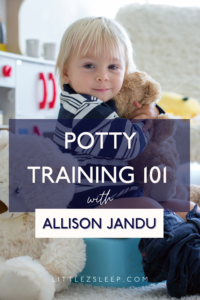We are in the middle of a series here at Little Z’s all about potty training. Last week we covered potty training in an open bed and this week I am bringing you a conversation that I had with Alison Jandu, who is the Potty Training Consultant. She is so wise and has some amazing books, courses and coaching to help families all over the world get their little one successfully potty trained!
In this episode, we talk about how to potty train when your child’s in a crib. If you are thinking that your child is showing signs that it’s time to potty train, but they’re under 3 and in a crib, this episode is for you!
ABOUT THE POTTY TRAINING CONSULTANT
After potty training her son (who was easy!) and her daughter (who was not), Allison realized that she was a rare person who really liked potty training so she started helping other families as the Potty Training Consultant.
You can find her courses and how to work with her on her website, but essentially she walks through everything you need to know about potty training, including:
- recognizing if your child is ready for potty training
- what signs to look for
- how to prepare your child
- how to prepare yourself and make sure that you’re ready for the whole process (because this is a very important step!!)
She also shares a step-by-step process to follow and customize your own potty training plan that matches your lifestyle and the way your child learns. The idea is that you do it once and do it right. You’ll also find troubleshooting help, how to handle daycare, and other specifics. A nighttime training guide is also available!
ALLISON’S NIGHTTIME POTTY TRAINING PHILOSOPHY
Usually around 2 1/2 years old and up children are ready for nighttime training. Often this is before their parents even realize it because a lot of times what happens is they’re sleeping all through the night and dry, and then as soon as they wake up in the morning, that’s when they wet their diapers. So you may think they’re waking up with a full diaper so they’re not staying dry all night, but a lot of times they’ve just waited until they have woken up to go.
While it’s not realistic for everybody, usually it’s most effective to do daytime and nighttime training all at the same time. Get rid of the diapers once and for all!
There are a couple of reasons for this:
- Consistency – By nighttime potty training at the same time as daytime, you’re not confusing your child at all. They’re keeping their pants dry all day and all night.
- Preventing withholding – Some kids will actually withhold all day long until they get their nighttime diaper on and then wait to go, which isn’t them really being potty trained, necessarily, they’re just holding it.
- They’re ready. Most of the time, they’re just ready.
In Allison’s book, The Wee Hours, about nighttime training specifically, she includes a guide of the best practices that she uses for nighttime potty training.
MISCONCEPTIONS ABOUT NIGHTTIME POTTY TRAINING
One of the common misconceptions is to keep kids in pull-ups for years and they’ll stay dry eventually. Unfortunately, that’s not always true. Sometimes those 6, 7, or 8 years olds haven’t had a chance to fully develop their muscle control. Their bodies have no reason to actually hold their pee.
But the 22-28 month window is usually an ideal time for potty training for most kids. Of course, every child and every situation is different and we’d never recommend forcing potty training into a routine just to hit a window, but this is a good age range to designate time to knock out potty training during the day and overnight.
HOW LONG DOES IT TAKE TO POTTY TRAIN?
With Allison’s methods, she recommends you block off one comprehensive weekend to start and then it’s an ongoing routine maintenance from there, and most people can usually get it done within about a week or two.
It also depends on how much time you have to really focus on potty training, if your child is in daycare, if they have specific developmental or medical situations, etc. But generally speaking, usually within a weekend you can really install the basics and set a good framework up. And then go from there.
HOW TO TELL IF YOUR CHILD IS READY FOR POTTY TRAINING
It’s been scientifically proven that the average child is physiologically capable of potty training at 18 months. In the 50s and the early 60s,18 months was the average potty training age. But from a developmental perspective, you want to look for things like enhanced communication skills and make sure that they have a really good grasp on their gross motor skills like sitting, walking, standing and squatting.
And generally, around that time, kids are more willing to want to help with things and feel like they’re contributing and helping you. They’re less resistant to change, because they don’t necessarily understand habits or anything like that, so it’s easier to transition them from one thing to another. They tend to be less stubborn and they’re more easily motivated by simple verbal praise versus bribing them to do something with candy or toys, which can happen with older kids.
So anytime you see your child starting to follow you into the bathroom, showing interest in flushing the potty, or if they start taking off their diaper randomly, hiding to poop, and generally kind of staying dry for longer periods during the day, that’s usually a good sign to go ahead and get started.
So if you are looking for a resource to turn to with all things potty training, I can’t recommend Allison Jandu enough!
LOVE THIS? SAVE FOR LATER!!

FLASH SALE
ONE WEEK ONLY
Keep sleep a thing on vacation with the Little Z's Travel Guide!